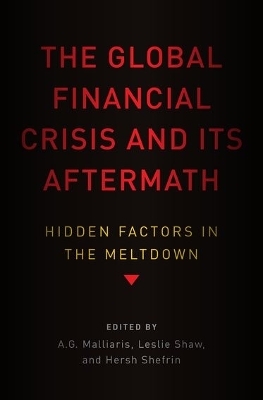
The Global Financial Crisis and Its Aftermath
Oxford University Press Inc (Verlag)
978-0-19-938622-2 (ISBN)
Contributors offer a constructive methodology suitable for exploring financial crises. They recognize how current economic analysis did not prepare academic economists, business economists, traders, and regulators to anticipate economic and financial crises. So, they search more extensively within the broader discipline of economics for ideas related to crises but neglected perhaps because they were not mathematically rigorous.
They affirm that the complexity of financial crises necessitates complementary research. Thus, to put the focal purpose of this book differently, they explore the Global Financial Crisis from three interconnected frameworks: the standards of orthodox economic analysis, Minskyan economics, and the role of ideas and values in economics.
Values are the subject of both philosophy and psychology and can contribute to a better understanding of the Global Financial Crisis. Values, in general, have been relatively neglected by economists. This is not because there is doubt about their significance, but rather because welfare economics and collective choice still operate within the neoclassical paradigm. This volume argues that analyzing the value implications requires moving from the neoclassical framework to something that is broader and multidisciplinary.
A.G. (Tassos) Malliaris is currently Professor of Economics and Finance and holds the Walter F. Mullady Sr. Chair in Business Administration at Loyola University Chicago. He specializes in financial economics and has made several contributions in the area of futures markets, options markets and risk management. He is President of the Athenian Policy Forum and Past-President of the Multinational Finance Society and the North American Economic and Finance Association. He has served as a member of boards of directors or investments committees in several organizations and is editor or associate editor in five journals. Leslie Shaw has an MBA and PhD in Behavioral Economics from the University of Chicago. After her PhD she completed five years of Post Doctoral work and graduated from the Chicago Institute for Psychoanalysis with a special interest in integrating theoretical psychoanalysis with the cognitive theoretical approaches that are foundational to Behavioral Economics. Prior to her doctoral work at the University of Chicago she spent several years in a variety of project management positions for one of the large international management-consulting firms. This valuable traditional MBA consulting experience provided her with a pragmatic business acumen in her study of the fallible aspects of judgment and decision processes within organizations. Leslie has been an invited speaker at a variety of business occasions and professional psychological conferences. Hersh Shefrin is the Mario L. Belotti Professor of Finance at Santa Clara University. He has published widely on a wide range of topics in mathematics, finance, and economics and is best known for his work in behavioral finance. A 2003 article in the American Economic Review includes him in the top 15 economic theorists to have influenced empirical work. His work is known for several firsts: an economic theory of self-control featuring a formal system 1/system 2 model, a behavioral explanation for the dividend puzzle, the disposition effect, behavioral portfolio theory, behavioral corporate finance, and behavioral pricing kernel theory.
I. INTRODUCTION
1. The Global Financial Crisis of 2007-09: An Overview of Neglected Ideas from Economics, Psychology, and Values
A.G. Malliaris, Leslie Shaw, and Hersh Shefrin
II. THE GLOBAL FINANCIAL CRISIS OF 2007-09 AND ECONOMICS
2. From Asset Price Bubbles to Liquidity Traps
A.G. Malliaris
3. A Minsky Meltdown: Lessons for Central Bankers
Janet Yellen
4. Modeling Financial Instability
Steve Keen
5. Assessing the Contribution of Hyman Minsky's Perspective to Our Understanding of Economic Instability
Hersh Shefrin
6. The Great Recession of 2008-09 and Its Impact on Unemployment
John Silvia
7. Mathematical Definition, Mapping, and Detection of (Anti)Fragility
Nassim Taleb and Rafael Douady
III. THE GLOBAL FINANCIAL CRISIS OF 2007-09 AND PSYCHOLOGY
8. The Varieties of Incentive Experience
Robert Kolb
9. Goals and the Organization of Choice Under Risk in Both the Long Run and the Short Run
Lola Lopes
10. Topology of Greed and Fear
Graciela Chichilnisky
11. A Sustainable Understanding of Instability in Minds and in Markets
Leslie Shaw
12. Existence of Monopoly in the Stock Market: A Model of Information-Based Manipulation
Viktoria Dalko, Lawrence R. Klein, S. Prakash Sethi, and Michael Wang
13. Crisis of Authority
Werner DeBondt
14. Social Structure, Power, and Financial Fraud
Brooke Harrington
IV. THE GLOBAL FINANCIAL CRISIS OF 2007-09 AND VALUES
15. Economics, Self Psychology, and Ethics: Why Modern Economic Persons Cheat and How Self Psychology Can Provide the Basis for a Trustworthy Economic World
John Riker
16. Finance Professionals in the Market for Status
Meir Statman
17. Why Risk Management Failed: Ethical and Behavioral Explanations
John Boatright
18. The Global Financial Crisis and Social Justice: The Crisis Seen Through the Lens of Catholic Social Doctrine
Paul Fitzgerald, S.J.
19. The Moral Benefits of Financial Crises: A Virtue Ethics Perspective
John Dobson
20. Three Ethical Dimensions of the Financial Crisis
Antonio Argandonan
V. EPILOGUE
21. Lessons for Future Financial Stability
A.G. Malliaris, Leslie Shaw, and Hersh Shefrin
| Erscheinungsdatum | 24.05.2016 |
|---|---|
| Verlagsort | New York |
| Sprache | englisch |
| Maße | 236 x 163 mm |
| Gewicht | 863 g |
| Themenwelt | Geschichte ► Teilgebiete der Geschichte ► Wirtschaftsgeschichte |
| Geisteswissenschaften ► Psychologie | |
| Wirtschaft ► Allgemeines / Lexika | |
| Wirtschaft ► Volkswirtschaftslehre ► Finanzwissenschaft | |
| ISBN-10 | 0-19-938622-6 / 0199386226 |
| ISBN-13 | 978-0-19-938622-2 / 9780199386222 |
| Zustand | Neuware |
| Informationen gemäß Produktsicherheitsverordnung (GPSR) | |
| Haben Sie eine Frage zum Produkt? |
aus dem Bereich


